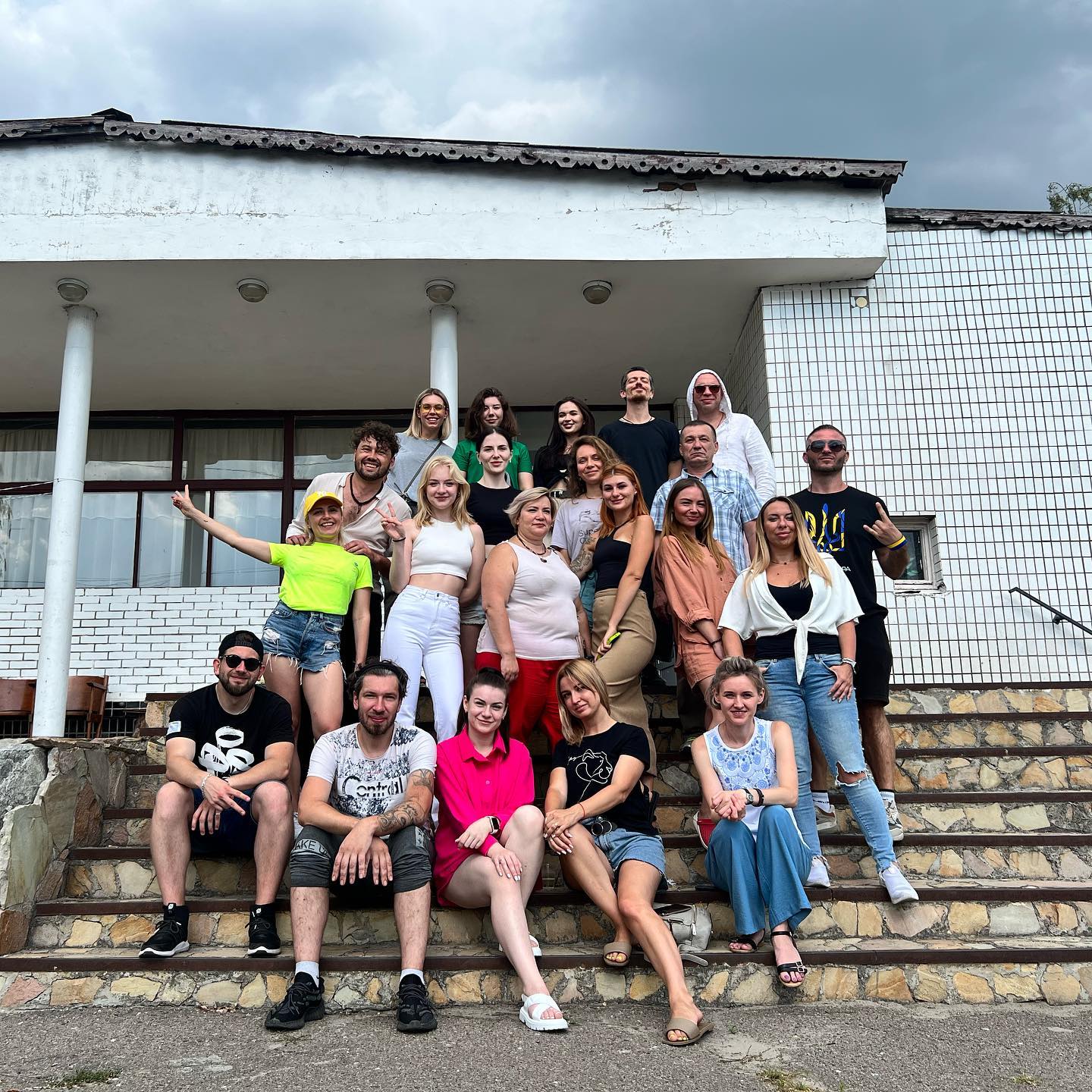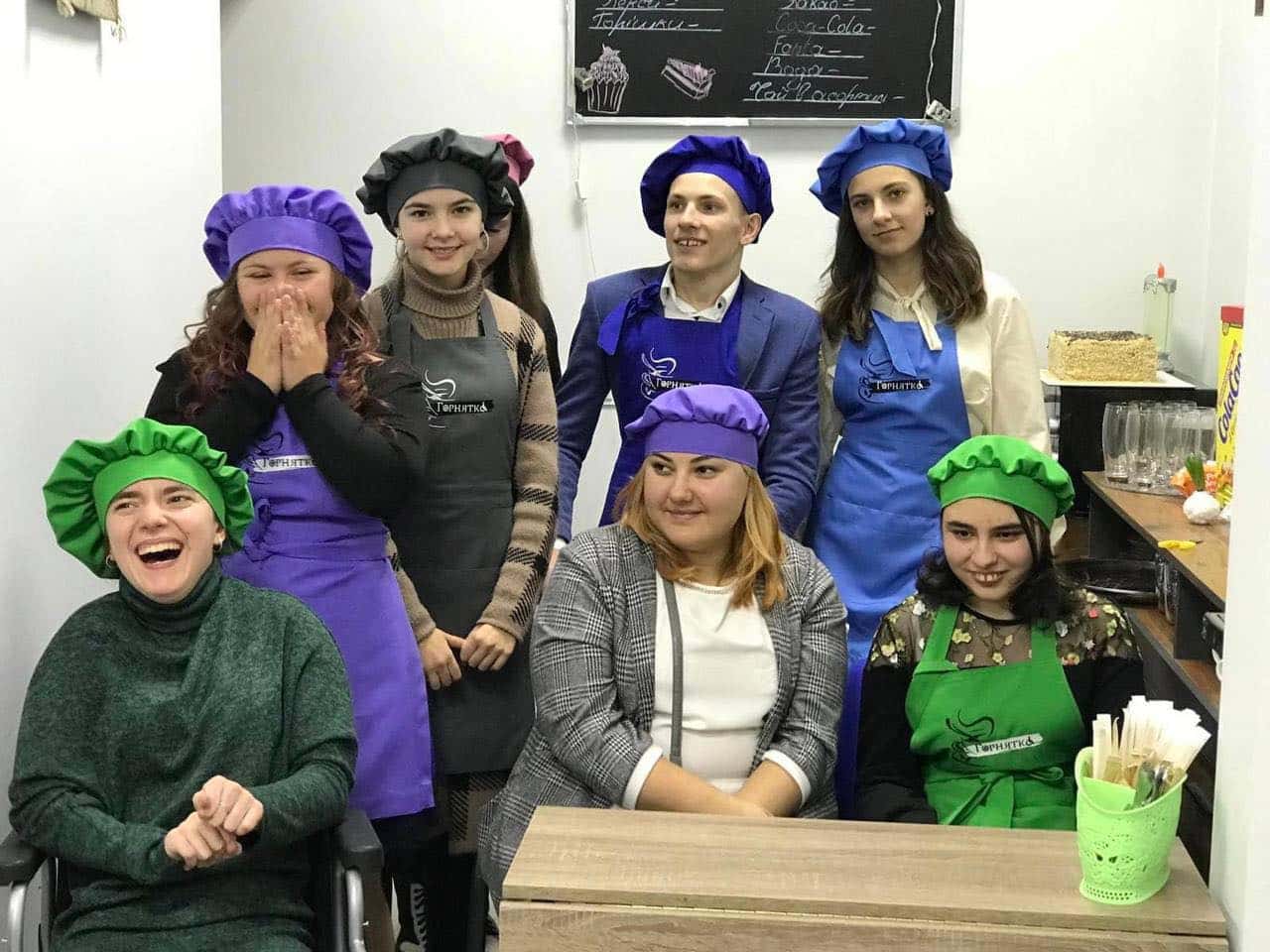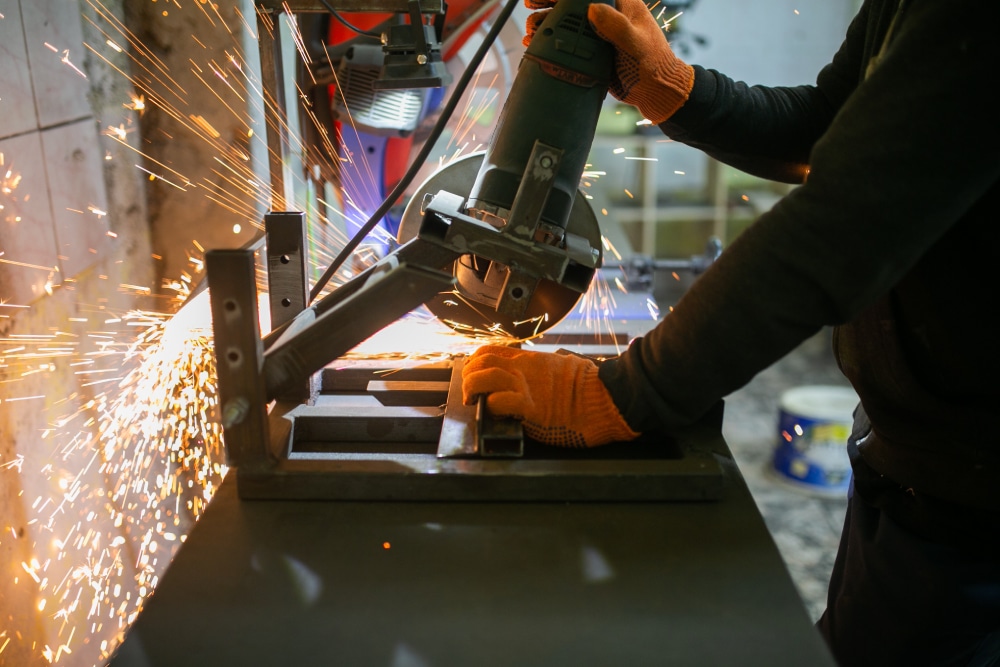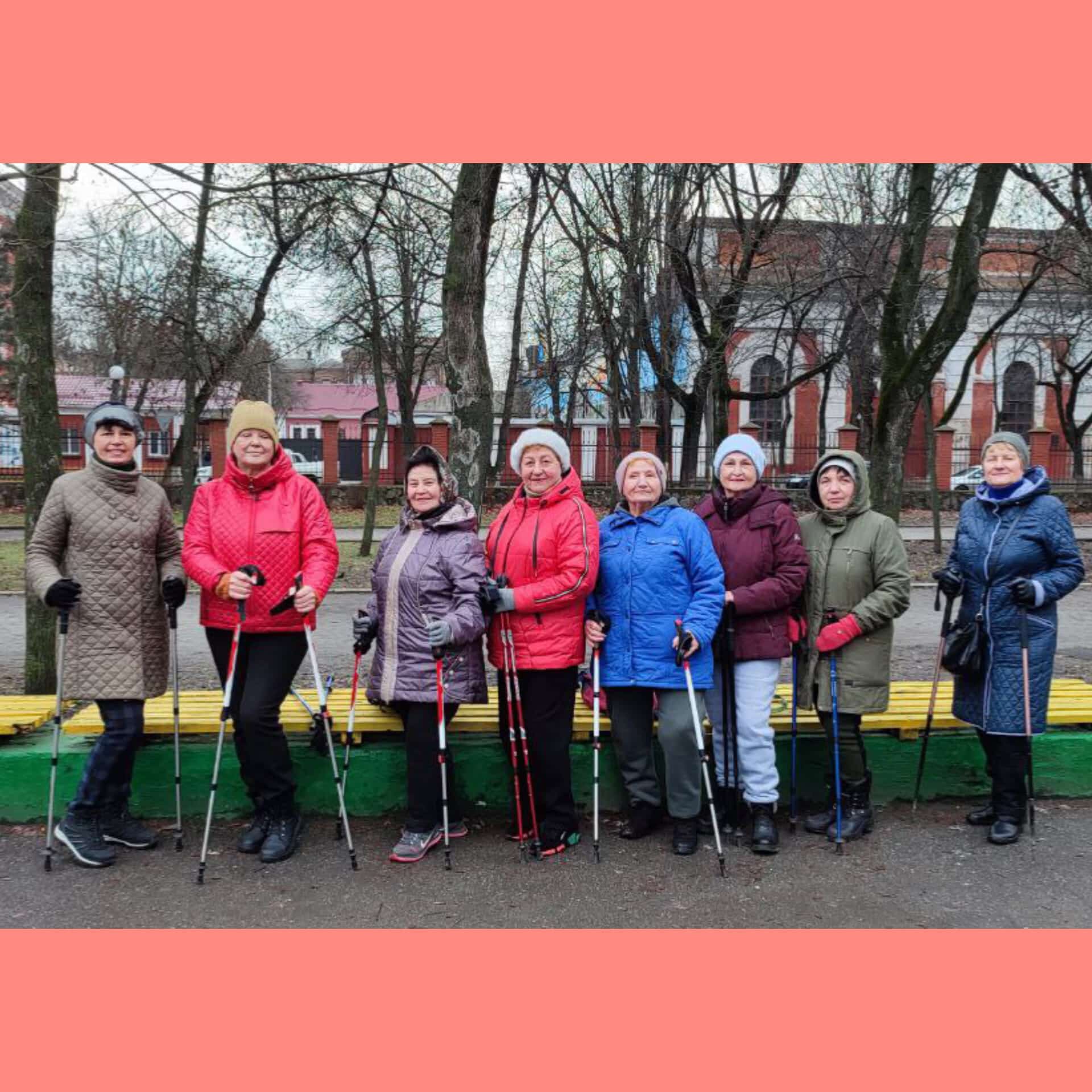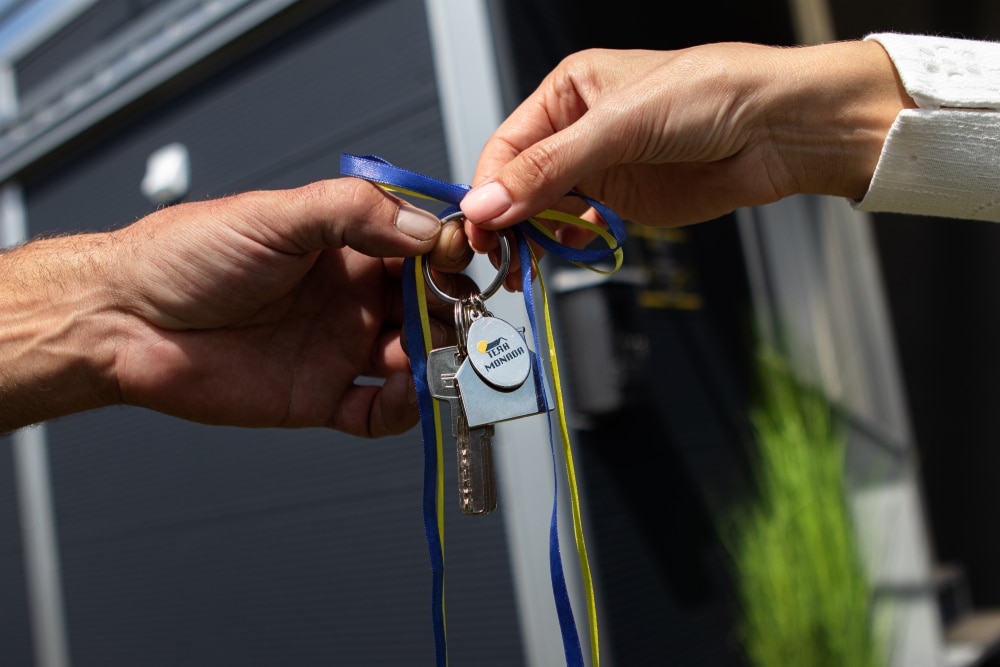Masters of manicure, masseurs, hair- and brow-stylists visit de-occupied villages and cities of Kyiv province to console locals by doing what they do best – offering their beauty services. To take care of oneself is an important part of mental support. We spoke to the founder of the project «Beauty Volunteers», Olha Belytska, about how and which parts of Kyiv province her team has already visited and how locals react to the offered services as well as why her mission is important.
How did the project come into being?
I came up with the idea back in April after I had made a few visits to hospitals where the wounded were treated. I wanted to do something for people who had lived under occupation. Everything was still shaking from explosions at that time, bombs were hissing and flying around, people would vanish, with others being killed. The only way to not go insane was helping others. On April 1 Kyiv province was liberated and the Russian army was pushed back from the city of Irpin. On May 26 we came to the city for the first time. Our team was made up of 12 people back then, among whom there were only a few members I knew personally, others were volunteers who joined us after learning about the initiative. Previously, I had published a post asking my friends to share it on their accounts. I then texted my acquaintances telling them about the project and asking them if they wanted to join. The vast majority of them said «yes».
At first, it was very difficult to go for it, since I thought that I would become the object of hate speech. Just think about it: people lived under occupation, their houses were destroyed, manicure was the last thing they thought about. However, we got lots of support and our initiative was actively shared by word of mouth. We did our 16th trip yesterday which involved 22 beauty specialists.
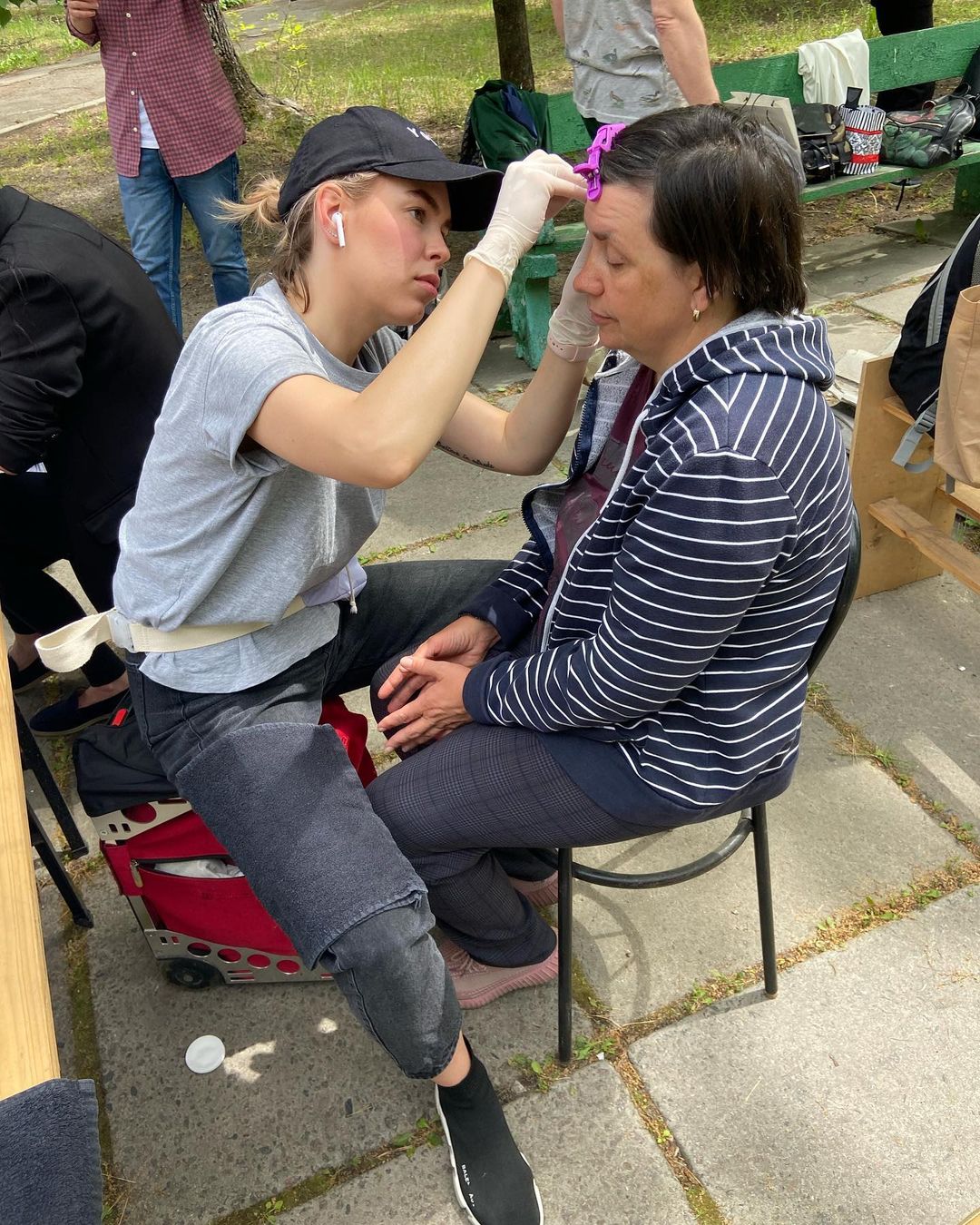
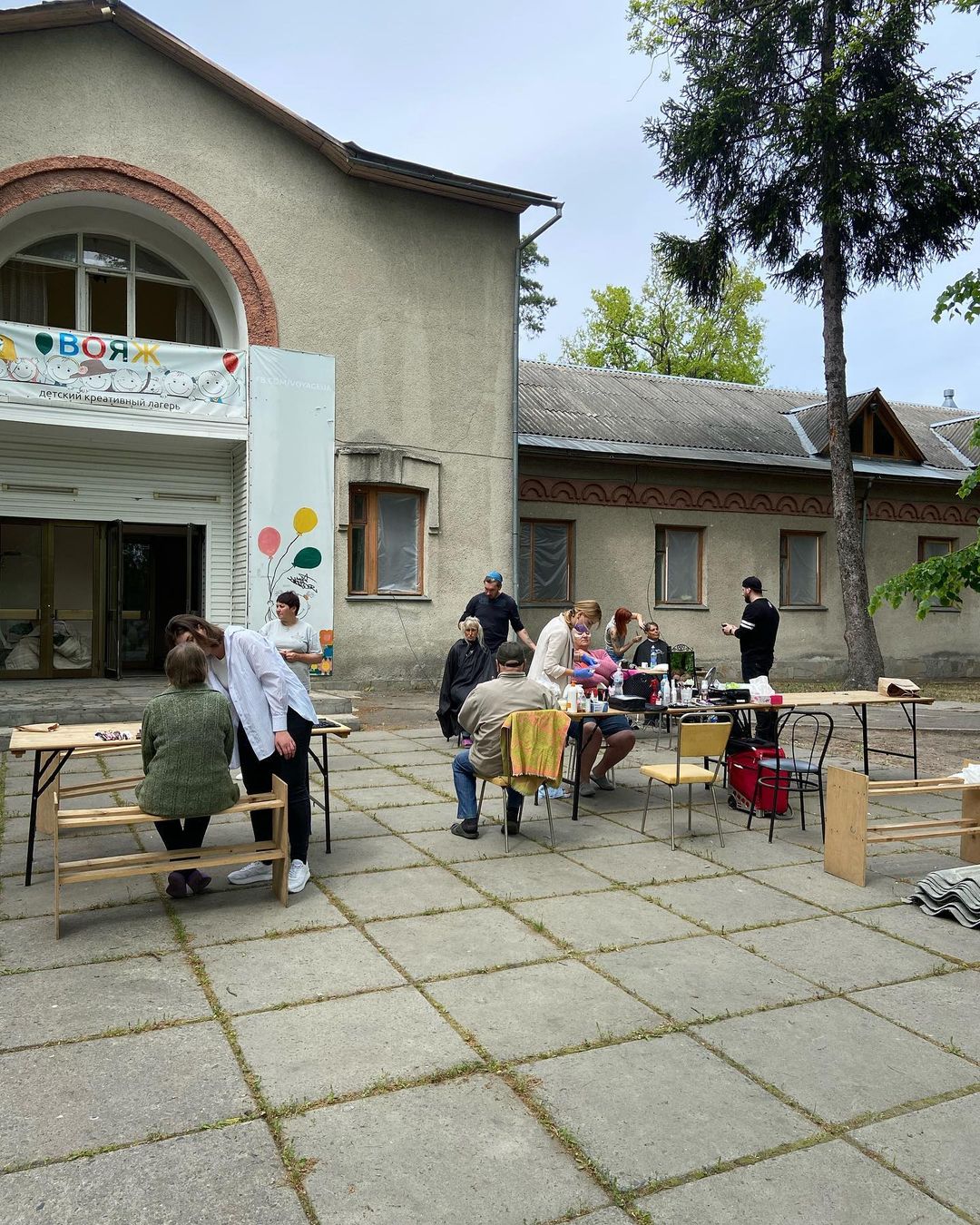
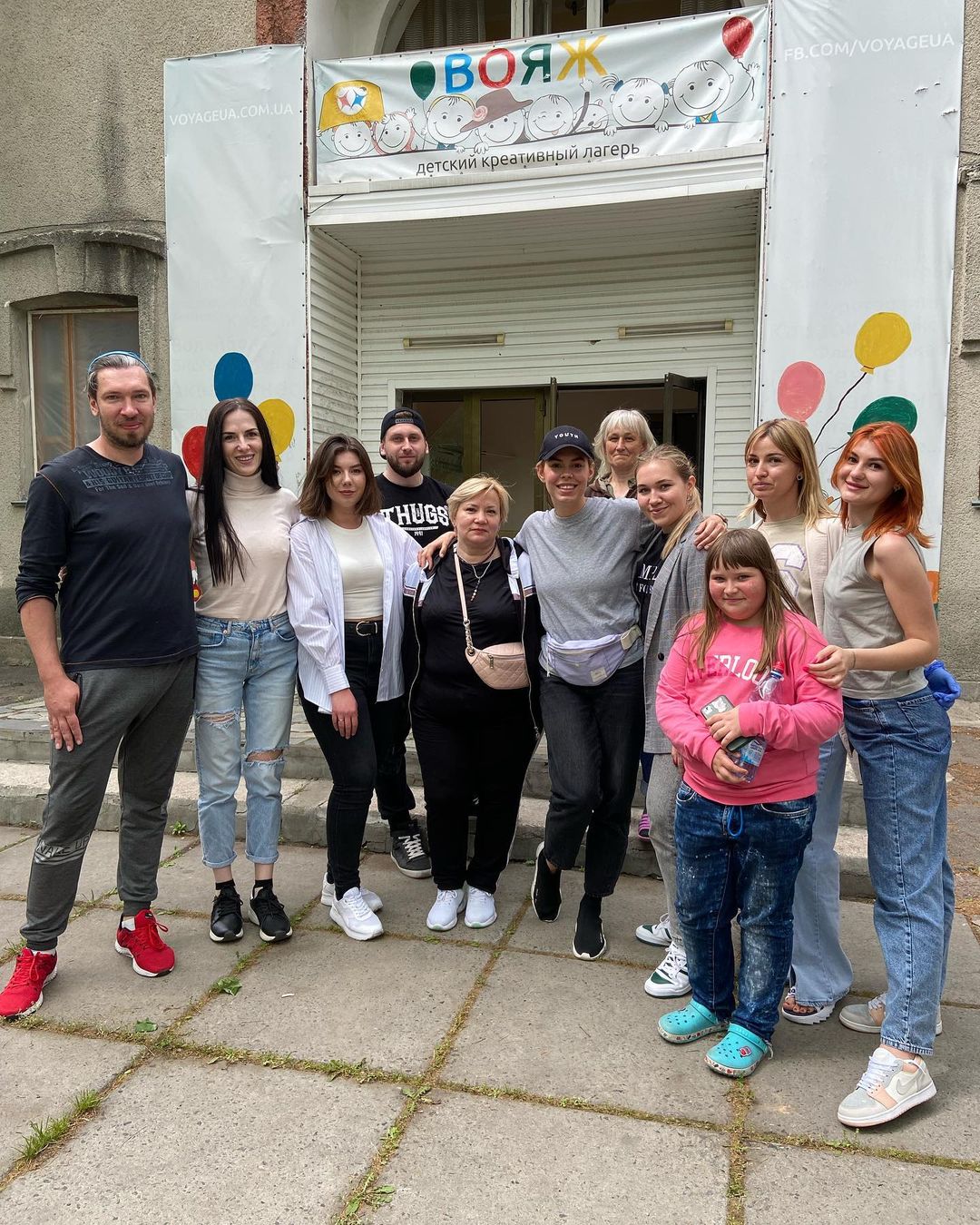
Where exactly were you working at that moment?
I have been working in the make-up industry for 7 years. My last job was that of a make-up artist working for a French brand in Ukraine and in a number of post-Soviet countries. I am now on maternity leave. My son’s two. My husband has supported me in everything, having also helped launch the initiative. Every day when I am away from morning till night (my team and I are away working in the field every Monday), my husband takes care of our son since he works remotely. We change shifts as he is also volunteering (he delivers bulletproof vests).
How many people are normally out there willing to participate in a beauty procedure?
On average there are about 50-70 clients. First, someone can have their hair cut, then have their nails done, then they may want to have their brows taken care of, get a massage or spend the whole day doing beauty procedures. When we came to Bucha and visited the city’s palace of culture located on the Yablunska street, about 100 people approached us. Our visit caused quite a stir.
What kind of services do you offer?
We cut hair, sometimes dye it, if conditions allow. We do nails, give body and face massage, we dye brows and do their correction. We also have two cosmetologists on our team who, depending on circumstances, can take basic care of one’s appearance. Some of the women who came to us had previously spent 40 days hiding in bomb shelters. Imagine our team coming to them and doing nice things to their faces – it works like a charm! People want to keep living after these sessions. Sometimes the place we do sessions in is located close to strategic objects, which means we may be visited by the military. We can quickly cut their hair, relieve pain in the shoulder, and remove the spasms.
Who is on your team?
Cosmetologists on our team are not newbies, they are specialists with extensive experience who can not only provide high-quality services, but know how to work with people. They know whom they are going to work with and how these people should be treated. We cannot just come to these people saying «Boy have these homes been destroyed!». One has to understand that people have PTSD issues. Sometimes our staff cannot take it. For example, when I was heading back home after one of our first trips, I remained totally silent. Sometimes you have to take a breath of fresh air outside because someone has just said something that touched a raw nerve. I am triggered by stories about children affected by the war, I don’t feel well at such moments.
Our team consists of people who are mentally resistant and can sensibly assess their emotional resources. Now as we are getting many requests from people willing to join our team, I turn lots of them down. In most cases people do want to work with us, but as soon as they face their first problems (like reaching a subway station located far away), they give up. Only those people stay who really want to work with us.
We’ve got people on our team whose sons or husbands have joined the Armed Forces of Ukraine, or whose brothers have gone missing. For them such work is a kind of salvation, because when you are left alone with your gloomy thoughts, you have to work with your hands.
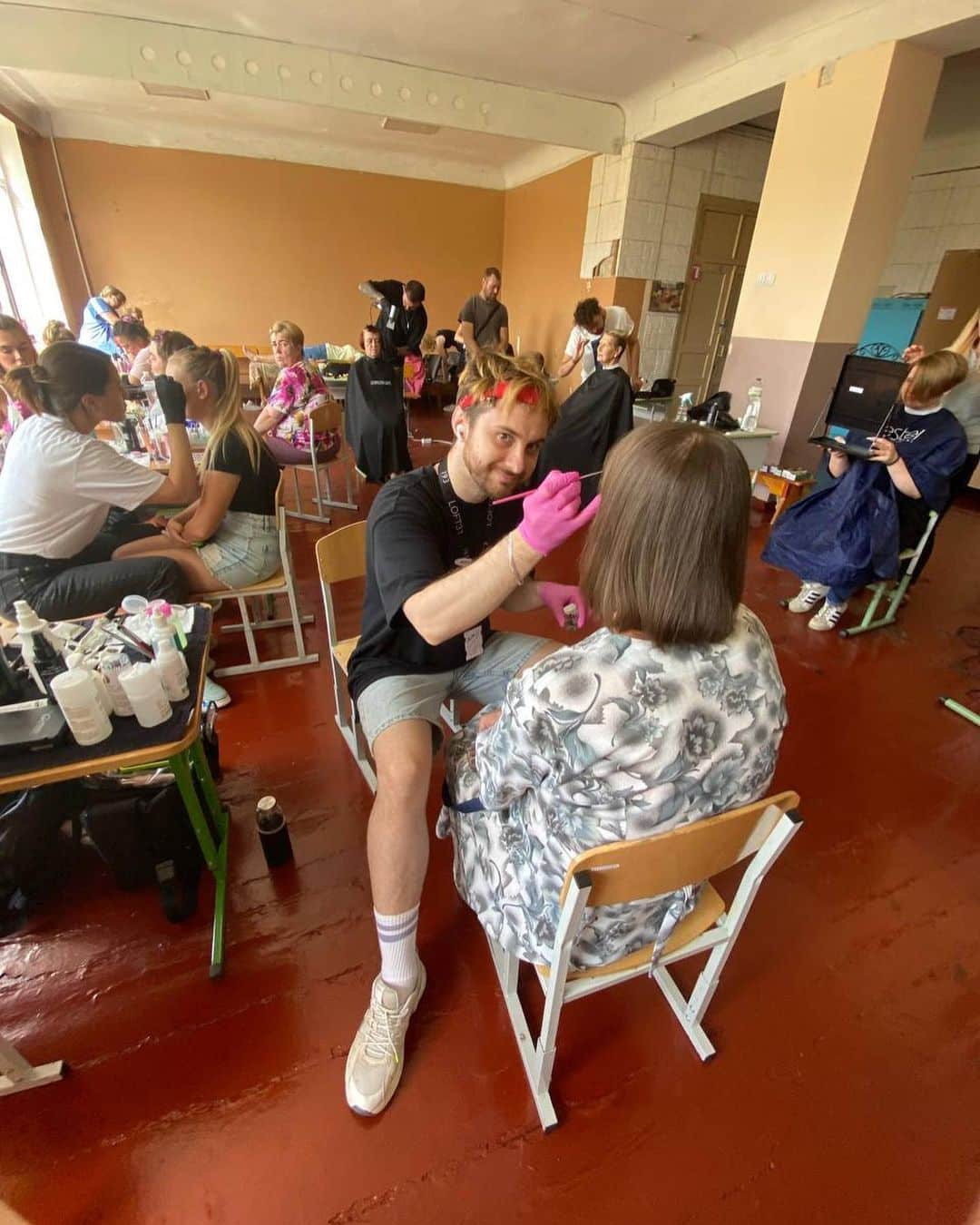
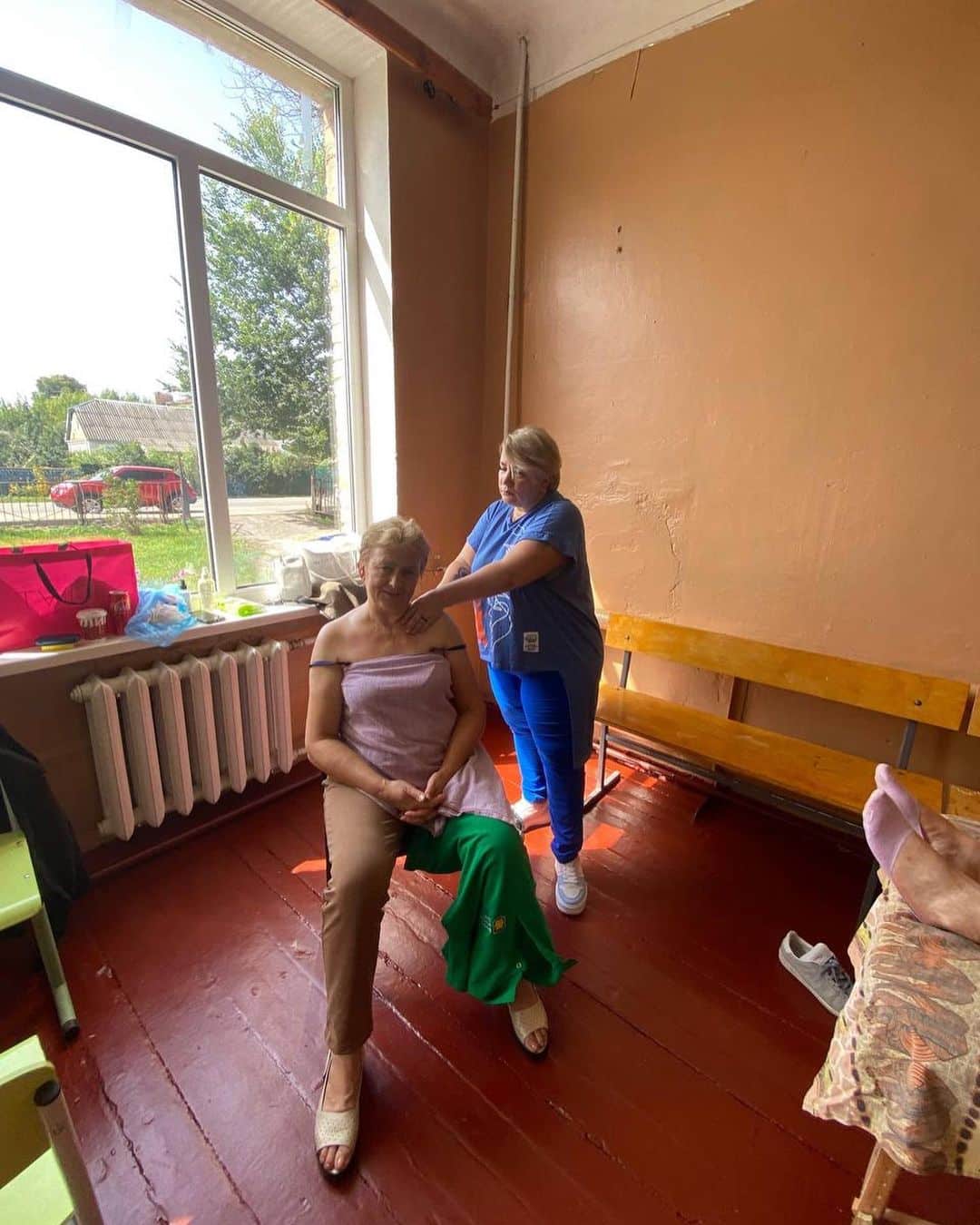
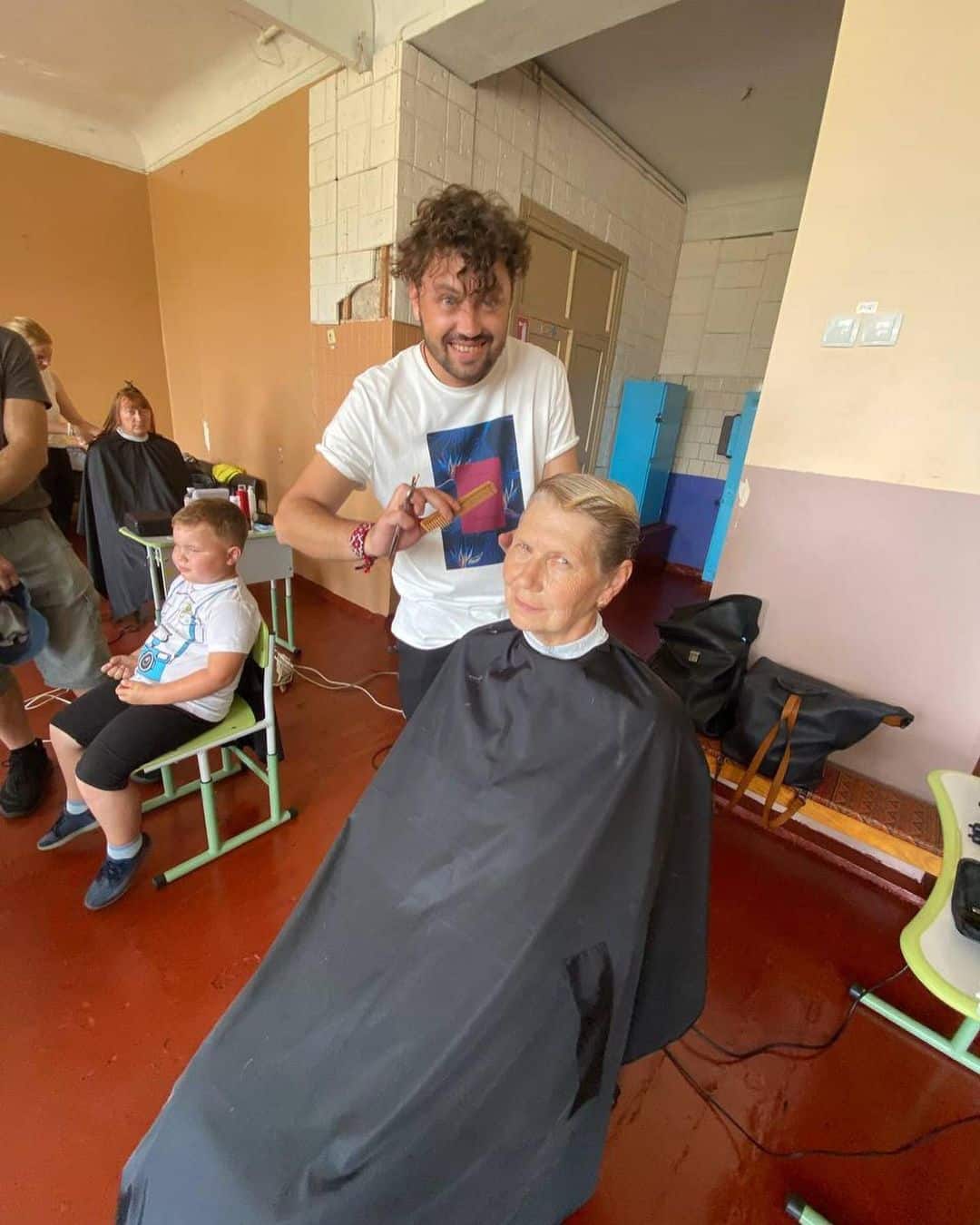
Do you find it difficult to manage the process as its organizer?
No, I’ve got girls who are running it. They helped me with everything I was doing at the very beginning, from searching for a place to taking care of other issues. Our communication with some of the communities is quite problematic. I guess it is important to find the right person at the very beginning who would be able to lead you. Sometimes I find people on the internet. For example, in Bucha I met residents of one of the nearby villages. I told them what we do and that we could visit them. People met my proposal with excitement, saying they wanted to speak with the village’s mayor. Currently, we are not looking for people whom we could help, it is them who are inviting us.
At first we bit off more than we could swallow. We came to Irpin and saw all the horrible atrocities. Volunteers like us are incredibly empathetic. They want to help children, pensioners, everyone. You have to understand that it’s not impossible, though. It is more effective to concentrate on one thing at a time. But we began doing everything at once – searching for washing machines, microwave ovens, humanitarian aid, kitchen utensils. We would visit places dragging packages with humanitarian aid behind us. At some point we reached the burnout stage because people who gave us humanitarian aid would ask us to come to them and collect it. It was challenging in terms of logistics. Plus, at that time lots of aid was being delivered into the region, so there was even a surplus of it.
So, currently our hairdresser Kyrylo is taking care of the humanitarian part of our work. He weekly collects donations and orders laundry detergent, soap, toothpaste, sweets for kids, I mean, basic necessities. When we arrive in a village, he distributes these kits among locals. It’s not much, just to help them keep afloat. We also respond to one-time requests if we do know for whom we are searching aid for and that there is a real need for it.
Wow, that’s great. I think people don’t even think about the «beauty» component of aid. However, from the perspective of mental health, it’s quite important.
When I talk to Ukrainian media, everyone understands that it’s not only about having your hair cut or nails done. It’s about holding a person by their hand, telling them you understand their pain, hugging and supporting them. In fact you may not necessarily understand them, but you want to help them to the best of your ability. In most cases you have to lend a sympathetic ear to them, this is already a huge help.
People are grateful for others taking care of them, providing them with a service, helping them «save money» (as they put it) or «cut away the negative energy». Call it as you might, this is our way of helping. Our clients are so grateful that they are ready to give us everything they have. They bring zucchini, apples, cucumbers, all sorts of vegetables they grow. It brings you to tears.
Do you still remember your first client on your first trip?
I do. It was a woman who at first was reluctant to approach me. I mean she seemed to be willing to come but she was shy. I told her, «Why are you standing over there? Come!». I began talking to her, offering her to do brows, and then she burst into tears. So did I. Well, the goal of our visit was to make people happy, not sad. I struck up a conversation with her, hugged her and distracted her from disturbing thoughts, although our conversation began with how great things used to be before the war. I cut her hair and she lightened up. I was pleased to see that change in her.
In our social networks stories you don’t always see the real conditions of our work, although we are trying to cover our trips objectively. Nobody is sponsoring us, nor are we promoting anyone. Sometimes we may get donations from friends, but that’s it. People often tell us something like «Wow, it seems like you have a funny and cool atmosphere there, I want to join you». They don’t know, however, that once we worked for 6 hours without access to water. We bought and carried it with us in containers.
Do you often work in such challenging conditions?
Yes, but people help us out. In Vyshhorod district, for instance, local administration is simply fantastic. We came to a village where locals called their administration saying that volunteers were coming and that there was no electricity in the local school. The administration almost immediately found an electric generator and connected it to the school’s grid. You have to keep in mind that we are talking about 7 hairdressers, each of whom is supposed to be working with their own hair dryer. In order to avoid a blackout, they used the dryer one at a time.
If someone wants to have their hair dyed, we tell them that we can do it but we can’t wash their hair off. Normally, people don’t see any problem with that. Someone finds a basin for this purpose while some people may say, «Oh, it’s not that bad, I live a stone’s throw away. I will wash my hair off at home».
Is everyone really that friendly?
Well, not always. It so happened that some people were not satisfied with everything. Once one of our volunteers was doing the nails of a woman whose friend was sitting next to her. They were chatting about how one of them would buy a car and the other one would deliver it. At the end of the procedure they looked at their nails saying «Well, nothing to write home about». And all of this happened in makeshift housing where people were living. I’ve got a question here – how did these two get in there? Did they take someone else’s place?
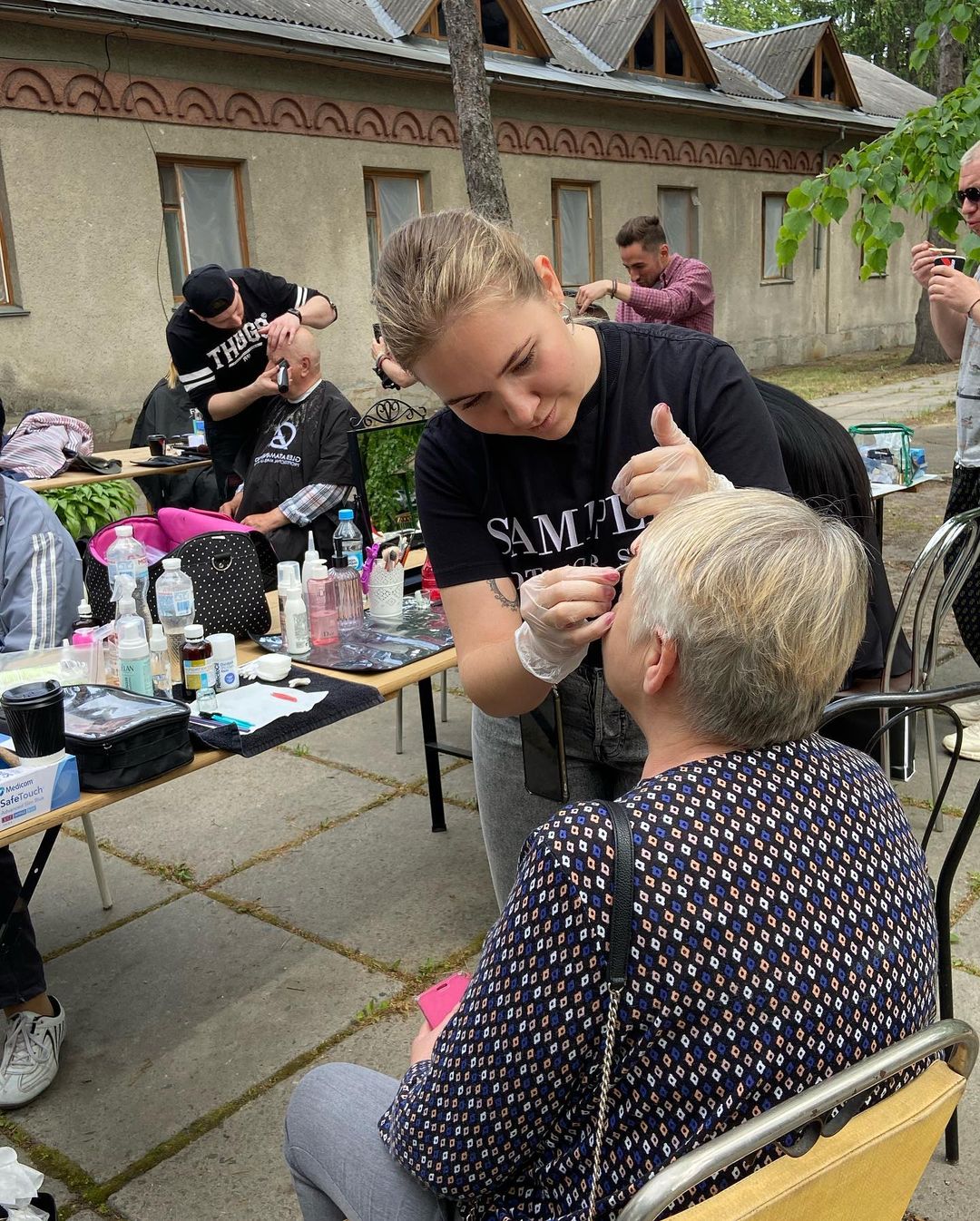
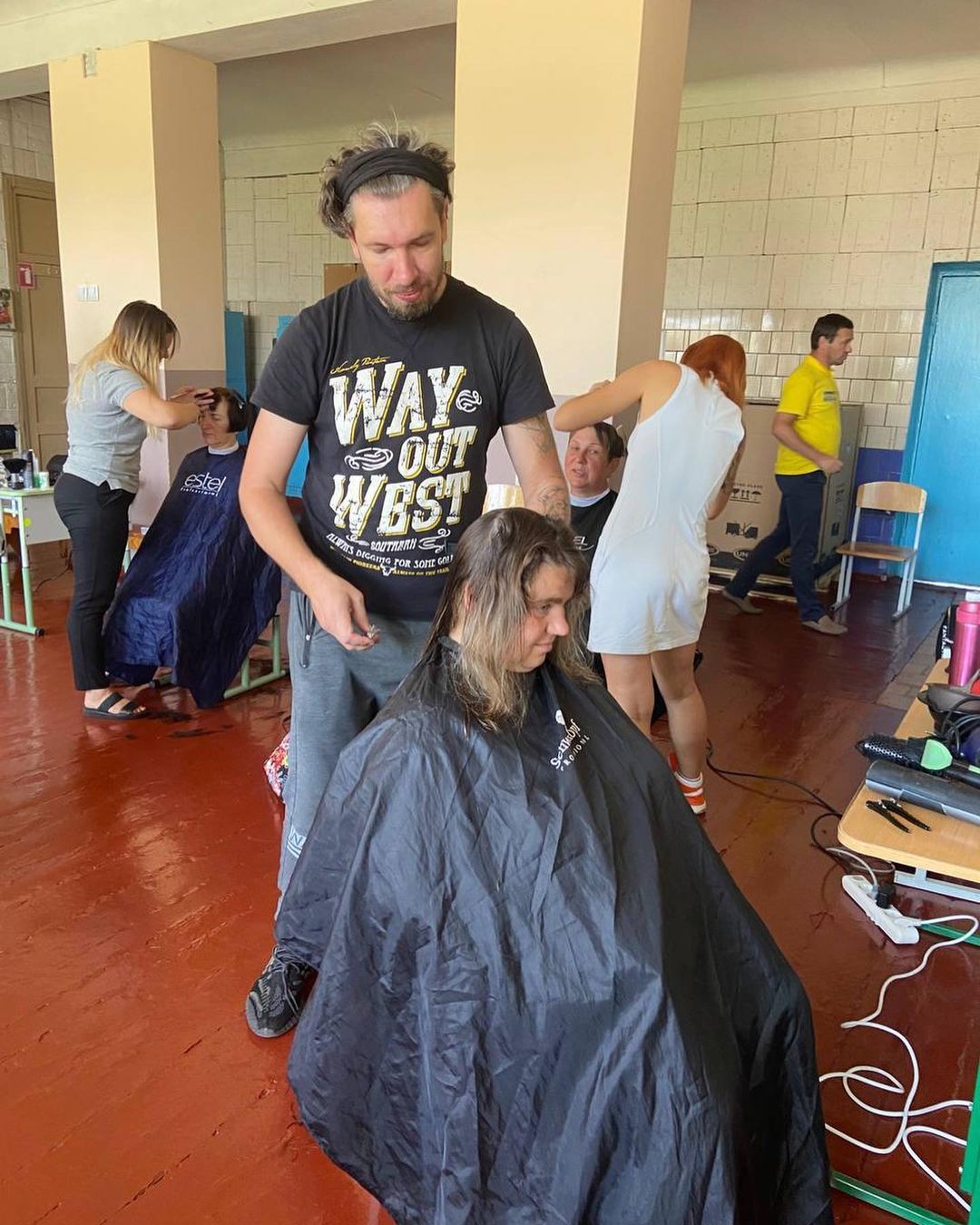
Are your services in high demand?
People come to us en masse. They are usually shy and afraid. They don’t believe in the idea that such services may be free. They find it suspicious. I mean, had the Russian invasion not happened, we would maybe not be doing this. But it is what it is. If we visit a community of people somewhere, or villages, they know about our arrival well in advance, doing a barbecue for us. We are gradually trying to help them get used to the fact that some services may be offered free of charge and that it is normal. For example, this is a widely known phenomenon in the USA. A friend of mine, who has been living there for years, once used Yevhen Klopotenko’s borsch recipe (a popular Ukrainian cook – translator’s note) and cooked lots of this dish to treat passers-by to it so that they would learn more about Ukraine and its citizens. Volunteering is a usual and integral part of their life there.
Where exactly are you going/have you been going?
Our first visit was to Irpin. We then visited Borodyanka twice. We no longer visit it since we’ve got followers who have picked up our cause there. As far as I know, they are not as active as us but they do cut people’s hair and do their nails. It’s cool that I have inspired someone to do this. We have also been to Bucha and four villages of the eponymous rayon. We have visited Vyshhorod rayon, Kozarovychi, Huta-Mezhyhirska, Lytvynivtsi. We are soon planning to go to Katyuzhanka and Demydiv. Next week we are going to Synyak, a town that has also been occupied. I’ve got a girl on my team who has lived under occupation there. We have not visited the Hostomel community yet as it’s quite difficult to communicate with those people. In the case of Bucha, our visit was not seamless, either. I had to call 6 people just to be able to get there.
The paradox is that you don’t benefit from it financially at all. On the contrary, you want to help and your help is not appreciated.
Why exactly is this direction of your work important?
It’s all about attention. Our manicure specialists, for example, often work in the capacity of a therapist. People talk to our volunteers with the latter lending them a sympathetic ear. People have gone through pain and they need to get it off their chest, they can’t hold it inside. The more they speak about it, the sooner they will continue living since they need to go through this phase of their lives. It is important for them to know that others hear and understand them, that you are not left face-to-face with your problems. I think this is our main mission.
Think of yourself in a crisis situation. The first person you start skimping on is you. Manicure, brows or haircut are the last things you think about. However, this used to be your habit, your link to normal life. Besides, it is important for people to be planning things. You can’t live if you do not have plans. And when you are stressed out, finding yourself in a psychological crisis, you are in a ‚groundhog situation‘ every day. I want to believe that our visits give people a kind of hope they are waiting for.
What do you get from your visits in terms of emotions?
We are used to not placing much value on our work. However, when we launched this initiative and society began taking interest in us, we came to realize that we were doing something really important. When I was reading the first article about volunteers of the beauty industry, I burst into tears.
What are your plans for the future?
For sometime our initiative will be existing well after our victory because this war will not end in one day. We will have to deal with its consequences for many years to come. Recently I spoke to my team, saying that although we seem to be always working outdoors, we cannot, for example, go out into a forest because everything around is mined.
I don’t want to grant franchise to anyone working in other regions. First, almost all high-skilled specialists have abandoned these regions. Second, I don’t know these people personally, which would be important as our project is socially responsible.

